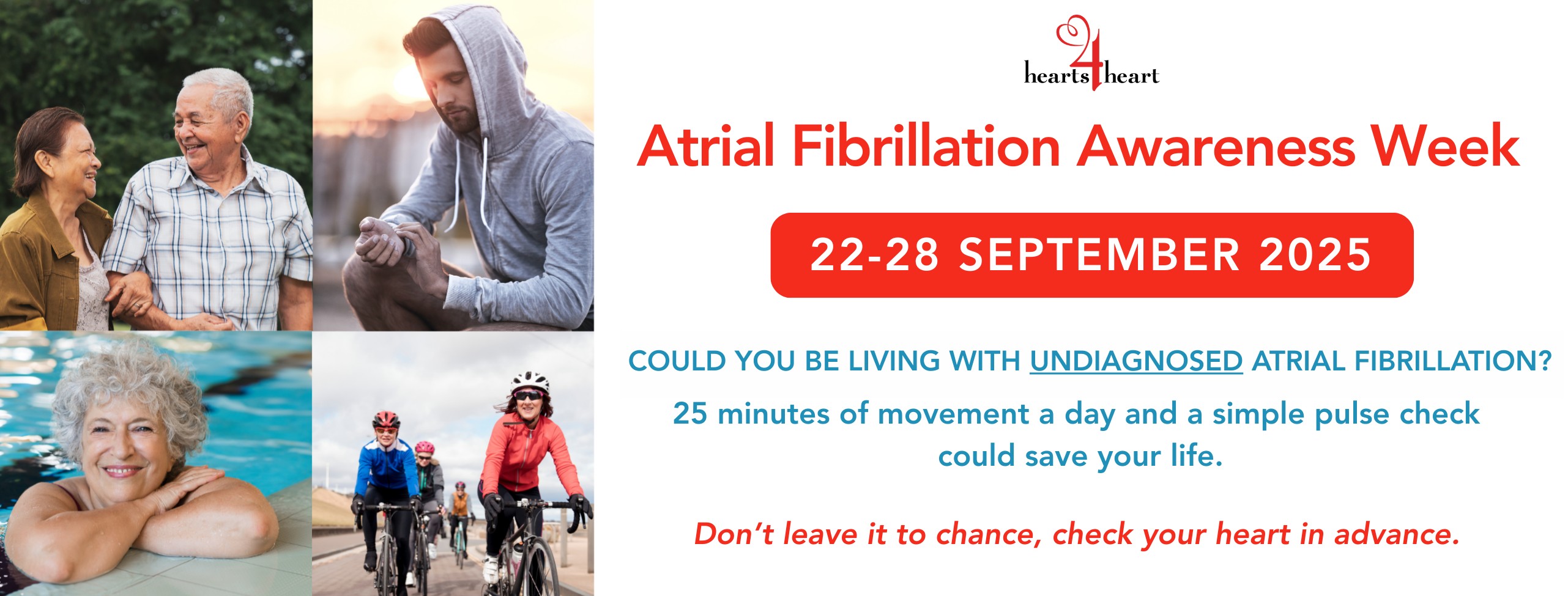Take time out of your busy day and make a Donation to an amazing cause. Shed some light on Heart Awareness

More than 110 Australians fall victim to stroke every day, with one-in-four attributed to atrial fibrillation (AF).1,2 AF impacts more than 500,000 Australians, with up to 30% unaware they are living with the condition.1,2,4 AF-related mortality rates have doubled over the last two decades, costing the health system more than $1.4 billion annually.4 It is the second most expensive cardiovascular condition in Australia and a major public health issue.
This Atrial Fibrillation Awareness Week, Hearts4heart CEO, Tanya Hall, and director, Dr Geoff Lester, are joining AF experts to raise awareness about prevention, symptoms, diagnosis and complications related to AF.








AF is when the heart’s upper chamber, the atria, beats abnormally. It occurs when there is a disturbance to the heart’s electrical system, resulting in an irregular pulse or heartbeat.1 This means the heart is not pumping blood around the body as well as it should, often leading to increased risk of stroke, heart failure or dementia.1,2,5
It is associated with high blood pressure, heart disease, obesity, alcohol consumption and other comorbidities such as type 2 diabetes and lung cancer.2 Increased risk can also be seen in some families.
AF can affect people in different ways and typically starts as short episodes, which can then become longer attacks overtime. This may eventually develop into permanent atrial fibrillation.
Hear from Hearts4heart CEO, Tanya Hall, on her experience living with atrial fibrillation:
Making lifestyle changes can help manage AF and reduce your risk of problems such as stroke. Your doctor may suggest:
Australians living with AF can also be supported by technological developments including medical devices such as pacemakers, which can be monitored remotely to help with heart health management. It’s important to regularly check your device is functioning accurately. If any issues arise, contact your specialist or GP for assistance.
Wearable devices such as smart watches, or knowing how to correctly check your pulse, can help identify possible AF symptoms.
In this video, Dr Geoff Lester demonstrates this simple, potentially lifesaving skill. Watch and follow him as he takes you through the steps.
If a very slow or very fast pulse is detected, visit your doctor and request a heart check with a stethoscope.
Cardiologist and best-selling author, Dr Warrick Bishop, emphasises that early diagnosis of AF is crucial. It enables timely access to treatment, slows disease progression, reduces the risk of stroke and can support overall quality of life.3
“Atrial fibrillation is known to cause the most debilitating strokes, but with early diagnosis and appropriate medical management, together with lifestyle changes and regular exercise, AF-related strokes are largely preventable,” said Dr Bishop.
If you think your heartbeat may be irregular, talk to your GP about atrial fibrillation.
Hearts4heart has developed a range of resources for all Australians to read and share with their families and friends:

1. Australian Institute of Health and Welfare. December 2024. Heart, stroke and vascular disease: Australian facts. Retrieved from https://www.aihw.gov.au/reports/heart-stroke-vascular-diseases/hsvd-facts/contents/all-heart-stroke-and-vascular-disease/atrial-fibrillation
2. Stroke Foundation. 2025. Retrieved from https://strokefoundation.org.au/about-stroke/prevent-stroke/atrial-fibrillation#:~:text=Atrial%20fibrillation%20is%20associated%20with,no%20family%20history%20of%20it
3. Heart Research Institute. November 2022. HRI appeal for funds: Heart rhythm clues in regular pulse check could stop stroke. Retrieved from https://www.hri.org.au/the-latest/news/heart-rhythm-clues-in-regular-pulse-check-could-stop-stroke#:~:text=%E2%80%9CThe%20aim%20of%20the%20trial,by%20up%20to%20five%20times.
4. Deloitte Access Economics. September 2011. Atrial fibrillation and the cost of preventable strokes.
5. Heart Research Institute. (2022). Link between Dementia and Atrial Fibrillation. Retrieved from https://www.hri.org.au/news/link-between-dementia-and-atrial-fibrillation-irregular-heartbeat